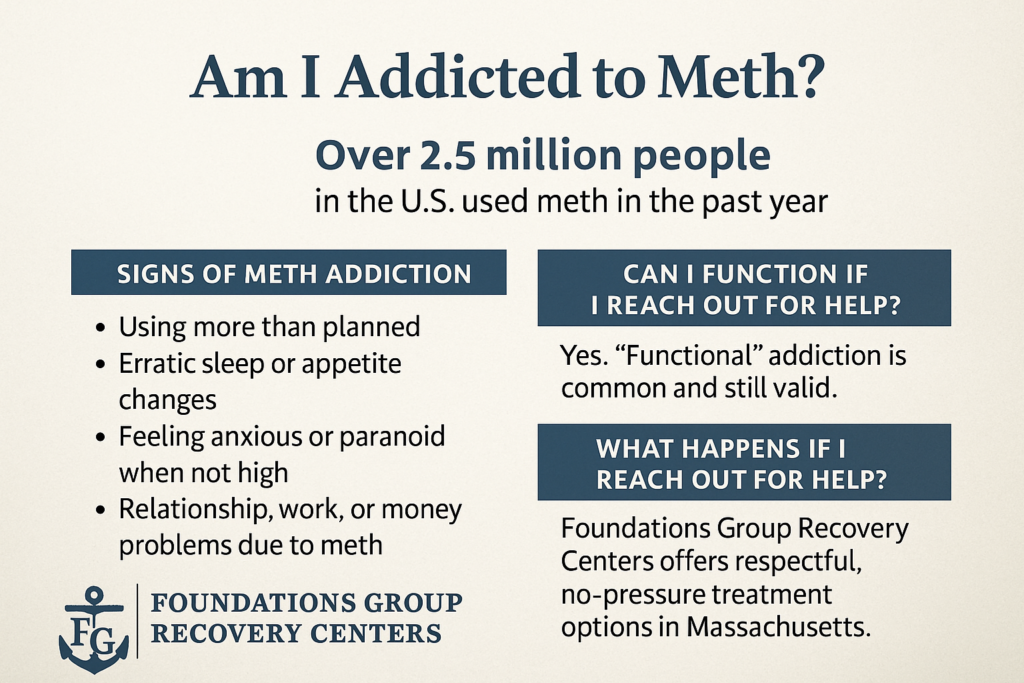It’s a question most people don’t want to ask—but if you’re here, some part of you is already wondering.
Maybe you’re holding a job, showing up for your family, and still feel like you’re barely holding it together. Maybe meth helps you power through your days—but you’ve started to notice cracks. Sleep that doesn’t come. A racing mind you can’t quiet. Relationships that feel strained, even if no one’s said anything out loud.
This blog isn’t here to diagnose you. It’s here to offer clarity—and a moment of honesty you can take at your own pace.
What Does Meth Addiction Actually Look Like?
Most people picture extremes: homelessness, lost teeth, or full psychosis. But meth addiction isn’t always visible from the outside. Some people using meth daily still go to work, pay bills, and keep up appearances.
Here’s the truth:
Addiction isn’t defined by how your life looks. It’s defined by what it costs you to keep it going.
If meth use is starting to feel like something you manage instead of control, or if quitting seems unimaginable, that’s worth paying attention to.
Signs You Might Be Struggling With Meth Addiction
You don’t need to check every box. But if any of these feel familiar, they may point to a deeper pattern.
Physical and Mental Health Red Flags:
- You need more meth than you used to just to feel “normal”
- Your sleep patterns are completely off—or you avoid sleeping altogether
- You feel wired, anxious, or paranoid even when you’re not high
- Your appetite has disappeared or shifted drastically
Behavioral and Emotional Signs:
- You’ve lied (even small lies) to hide how much or how often you’re using
- You find yourself thinking about your next hit more than you’d like to admit
- You’ve tried to cut back or quit but always end up using again
- You feel like two different people—public you, and the version no one sees
Relationship and Life Impact:
- Friends or family have started to pull away—or you’ve pushed them away
- You keep your phone close, not just for connection, but to avoid being “caught”
- You’ve skipped responsibilities or plans because of using or recovering
- Even when things go wrong, meth still feels non-negotiable
Can I Be Addicted to Meth If I’m Still “Functioning”?
Yes. And it’s one of the most overlooked realities in addiction.
People who are highly functional often delay getting help because they’re waiting for a breakdown big enough to “prove” something’s wrong. But waiting for a crisis isn’t necessary. In fact, early support often means better outcomes.
If you’re managing the outside but suffering inside—exhausted, tense, emotionally numb—that’s valid. Meth may be keeping you upright, but it’s likely also what’s hollowing you out.
What Happens If I Reach Out for Help?
That depends on where you reach out—but at Foundations Group Recovery Center, you won’t get judgment or pressure. You’ll get a conversation with someone who understands addiction and can help you figure out what kind of support fits where you are.
Treatment isn’t one-size-fits-all. If you’re not ready to stop entirely, we’ll still talk with you. If you’re unsure whether you belong in a program, we’ll explain your options.
Here in Massachusetts, our meth addiction treatment programs are built around clarity, respect, and care. Whether it’s intensive outpatient treatment (IOP), day treatment, or ongoing support, our team is here to walk beside you—not push you into something that doesn’t fit.
How Do I Know If I’m Ready for Treatment?
You don’t have to feel ready. You just have to be curious enough to ask.
Most people don’t have an “aha” moment. It’s quieter than that. It might be noticing you don’t feel like yourself anymore. It might be a bad comedown that rattled you. Or a conversation that stuck in your mind longer than it should have.
If any of that sounds familiar, then yes—you’re allowed to explore treatment. You don’t have to hit bottom. You don’t need to feel certain. You just need to know that something in you is asking for rest.
And rest is allowed.
FAQ: Common Questions About Meth Addiction and Treatment
Do I have to stop using completely to get help?
Not necessarily. At Foundations Group Recovery Center, we meet you where you are. Some people start by reducing use, exploring outpatient options, or just talking it through.
What’s the first step if I think I need help?
Start with a conversation. Call us at (844)763-4966 or visit our meth addiction treatment page in Massachusetts. You don’t need to have all the answers—we’re here to help you figure them out.
What kind of treatment programs are available?
We offer several levels of care, including intensive outpatient programs (IOP), day treatment, and personalized support. Our team helps you find the right fit for your schedule, needs, and comfort level.
Is meth addiction treatable?
Yes. Recovery is absolutely possible. We’ve seen people come back to themselves—fully. It takes support, structure, and willingness—but we’ll be with you every step of the way.
When You’re Ready, We’re Here
You don’t have to be sure. You don’t have to have a plan. You just have to be honest enough to wonder.
If something in you is asking the question—Am I addicted to meth?—let’s talk it through. Quietly. Clearly. With zero judgment.
📞 Call us today at (844)763-4966 to start a conversation about meth addiction treatment in Massachusetts. Foundations Group Recovery Center is here when you’re ready.


